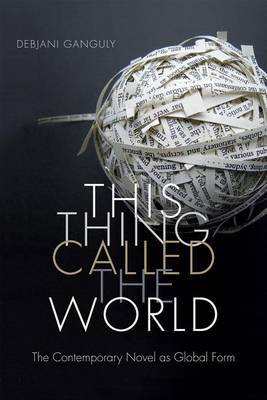
Stock image for illustration purposes only - book cover, edition or condition may vary.
This Thing Called the World: The Contemporary Novel as Global Form
Debjani Ganguly
€ 45.72
FREE Delivery in Ireland
Description for This Thing Called the World: The Contemporary Novel as Global Form
Paperback. Debjani Ganguly theorizes the contemporary global novel and the social and historical conditions that shaped it, showing how in 1989 the consolidation of the information age, the perpetual state of war, and the focus on humanitarianism transformed the novel into a form that addresses contemporary social, technological, and political upheavals. Num Pages: 312 pages, 5 illustrations. BIC Classification: 2AB; DSA; DSK. Category: (G) General (US: Trade). Dimension: 154 x 229 x 20. Weight in Grams: 464.
In This Thing Called the World Debjani Ganguly theorizes the contemporary global novel and the social and historical conditions that shaped it. Ganguly contends that global literature coalesced into its current form in 1989, an event marked by the convergence of three major trends: the consolidation of the information age, the arrival of a perpetual state of global war, and the expanding focus on humanitarianism. Ganguly analyzes a trove of novels from authors including Salman Rushdie, Don DeLillo, Michael Ondaatje, and Art Spiegelman, who address wars in Iraq, Afghanistan, and Sri Lanka, the Palestinian and Kashmiri crises, the Rwandan genocide, and post9/11 terrorism. These novels exist in a context in which suffering's presence in everyday life is mediated through digital images and where authors integrate visual forms into their storytelling. In showing how the evolution of the contemporary global novel is analogous to the European novel's emergence in the eighteenth century, when society and the development of capitalism faced similar monumental ruptures, Ganguly provides both a theory of the contemporary moment and a reminder of the novel's power.
Product Details
Publisher
Duke University Press
Format
Paperback
Publication date
2016
Condition
New
Number of Pages
312
Place of Publication
North Carolina, United States
ISBN
9780822361565
SKU
V9780822361565
Shipping Time
Usually ships in 7 to 11 working days
Ref
99-50
About Debjani Ganguly
Debjani Ganguly is Professor of English and Director of the Institute of the Humanities and Global Cultures at the University of Virginia. She is the author of Caste and Dalit Lifeworlds: Postcolonial Perspectives.
Reviews for This Thing Called the World: The Contemporary Novel as Global Form
Beautifully connects the sentimental novels of the eighteenth century to their contemporary equivalent . . . Ganguly remains true to the real-world voices of the novelists throughout her work, marrying aesthetics and ethics. . . . She also maintains a refreshing level of detail within the texts themselves, sweeping readers into the heart-wrenching and critical foci of the novels' collectivity while maintaining a thorough, accessible argument outlining specific interventions into our global understanding.
Beth Miller
The Comparatist
Ganguly's disentangling of the terms 'postcolonial,' 'global,' and 'world' in the introduction is much needed and persuasive. . . . A brave and important book.
Claire Chambers
MFS Modern Fiction Studies
Against the grain of much contemporary criticism, which has jettisoned the notion of imaginative sympathy from literary discourse, Ganguly seizes on exactly this as critical to the post-1989 experience: 'the information technology revolution has radically transformed our threshold of responsibility to our distant others and has perforce brought worlds of untold suffering into our intimate spaces.'
Michael LaPointe
Times Literary Supplement
This Thing Called the World both models and theorizes a grounded approach to modern world literature, urging its critics, despite our habit to look beyond the horizon, not to forget the dirt beneath our own feet.
Christopher McVey
Studies in the Novel
This is a brave book, a valiant and valuable book, that seeks to characterize post-1989 fiction as ekphrastically humanitarian.
Eugene Eoyang
World Literature Today
A dense, learned, and important study of the emergence of this thing called the world as its inhabitants pass from spectatorship to witnessing of trauma under the prevailing conditions of intensified mediation, remediation, and hypermediation. . . . A rich resource that will be mined by many. . . . Highly recommended. Graduate students, researchers, faculty.
K. Toeloelyan
Choice
Beth Miller
The Comparatist
Ganguly's disentangling of the terms 'postcolonial,' 'global,' and 'world' in the introduction is much needed and persuasive. . . . A brave and important book.
Claire Chambers
MFS Modern Fiction Studies
Against the grain of much contemporary criticism, which has jettisoned the notion of imaginative sympathy from literary discourse, Ganguly seizes on exactly this as critical to the post-1989 experience: 'the information technology revolution has radically transformed our threshold of responsibility to our distant others and has perforce brought worlds of untold suffering into our intimate spaces.'
Michael LaPointe
Times Literary Supplement
This Thing Called the World both models and theorizes a grounded approach to modern world literature, urging its critics, despite our habit to look beyond the horizon, not to forget the dirt beneath our own feet.
Christopher McVey
Studies in the Novel
This is a brave book, a valiant and valuable book, that seeks to characterize post-1989 fiction as ekphrastically humanitarian.
Eugene Eoyang
World Literature Today
A dense, learned, and important study of the emergence of this thing called the world as its inhabitants pass from spectatorship to witnessing of trauma under the prevailing conditions of intensified mediation, remediation, and hypermediation. . . . A rich resource that will be mined by many. . . . Highly recommended. Graduate students, researchers, faculty.
K. Toeloelyan
Choice
